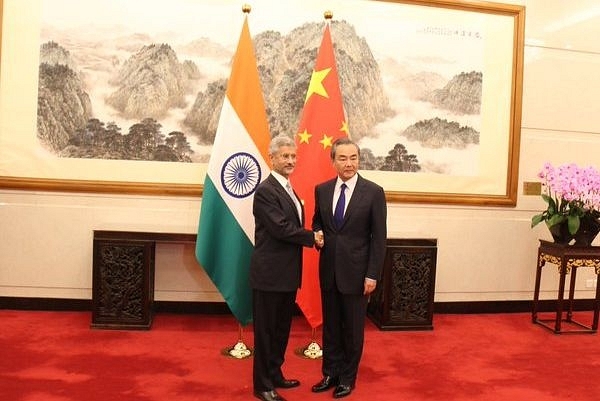Insta
Jaishankar - Wang Meet: India Won't Permit Unilateral Change In Status Quo On LAC, Joint Statement Calls For Disengagement

EAM S Jaishakar with Chinese FM Wang Yi (@EOIBeijing/Twitter/File Photo)
India's External Affairs Minister S Jaishankar and his Chinese counterpart Wang Yi met late Thursday evening in Moscow on the sidelines of the Shanghai Cooperation Organisation (SCO) meetings.
The Indian delegation is said to have made it clear that New Delhi will not permit any unilateral change in status quo on the Line of Actual Control (LAC). The Indian side has also emphasised that the Indian Army troops had 'scrupulously followed all agreements and protocols pertaining to the management of the border areas'
India conveyed its strong concerns about large deployment of Chinese troops and equipment along the border areas in Eastern Ladakh. Such a large troop presence was not in accordance with bilateral pacts of 1993 and 1996 on border issues, India further pointed out.
External Affairs Minister Jaishankar made it clear that an 'urgent resolution of the current situation was in the interest of both the nations'. A joint statement calls for disengagement of troops and for the military commanders of two sides to work out the process.
The full text of the joint-statement issued after the meeting is below:
H.E. Dr. S. Jaishankar, External Affairs Minister of India met H.E. Wang Yi, State Councillor and Foreign Minister of China on 10thSeptember in Moscow on the side-lines of the Shanghai Cooperation Organisation (SCO) meeting. Both Ministers had a frank and constructive discussion on the developments in the India-China border areas as well as on India-China relations and agreed as follows:
1. The two Ministers agreed that both sides should take guidance from the series of consensus of the leaders on developing India-China relations, including not allowing differences to become disputes.
2. The two Foreign Ministers agreed that the current situation in the border areas is not in the interest of either side. They agreed therefore that the border troops of both sides should continue their dialogue, quickly disengage, maintain proper distance and ease tensions.
3. The two Ministers agreed that both sides shall abide by all the existing agreements and protocol on China-India boundary affairs, maintain peace and tranquillity in the border areas and avoid any action that could escalate matters.
4. The two sides also agreed to continue to have dialogue and communication through the Special Representative mechanism on the India-China boundary question. They also agreed in this context that the Working Mechanism for Consultation and Coordination on India-China border affairs (WMCC), should also continue its meetings.
5. The Ministers agreed that as the situation eases, the two sides should expedite work to conclude new Confidence Building Measures to maintain and enhance peace and tranquillity in the border areas.
Support Swarajya's 50 Ground Reports Project & Sponsor A Story
Every general election Swarajya does a 50 ground reports project.
Aimed only at serious readers and those who appreciate the nuances of political undercurrents, the project provides a sense of India's electoral landscape. As you know, these reports are produced after considerable investment of travel, time and effort on the ground.
This time too we've kicked off the project in style and have covered over 30 constituencies already. If you're someone who appreciates such work and have enjoyed our coverage please consider sponsoring a ground report for just Rs 2999 to Rs 19,999 - it goes a long way in helping us produce more quality reportage.
You can also back this project by becoming a subscriber for as little as Rs 999 - so do click on this links and choose a plan that suits you and back us.
Click below to contribute.
Latest